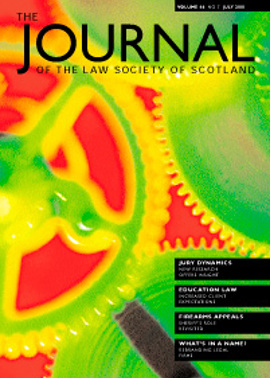President’s report
As this edition of the Journal is published, I am looking forward to the family summer holiday. As well as a welcome opportunity to recharge batteries and get away from it all, I find holidays a period of reflection and, before unwinding too much, a time of taking stock.
As the politicians take their summer break they may be reflecting on the General Election, and the issues it raised. Many have talked of apathy in the Westminster election but the work on issues from globalisation to law and order continues.
It is also certain that interest in the Scottish Parliament, its work and the effect it is having on Scotland continues to run high.
The changes in Scotland over the last two years are certainly worth reflection. It is hard to believe that the Parliament is now two years old - on the one hand it still seems so new and on the other, when one considers the work undertaken and the legislation passed, it could have been in existence for much longer. The areas covered by new law demonstrate
not only the pent up need for legislative attention but also the fact that Scots lives have been affected by what has been achieved.
The Parliament’s committee structure has heralded a new style of government, allowing a great deal of work and consultation before an issue reaches the Chamber. Solicitors, like politicians, work with people on issues from business to human rights and from crime to property. We are also in the business of change and making better law for people to live by. The Society has given evidence to Committees on such matters as legal aid, an international criminal court and regulation of the legal profession in Scotland.
One of the most refreshing things about the system is the fact that the Committees allow detailed examination of matters affecting citizens and society in Scotland. Evidence was recently given to the Justice 1 Committee in connection with its inquiry into the provision of Legal Aid in Scotland. Gerry Brown and Ian Smart as Convener and Vice Convener of the Legal Aid Committee and Michael Clancy and Anne Keenan from the Society’s executive, gave detailed evidence of their concerns about the limited availability of civil legal aid amongst other issues. It is encouraging that the Committee saw access to justice as a matter of importance and I await the results of the inquiry with interest.
Another inquiry of interest is the Justice 1 Committee inquiry into the regulation of the legal profession n Scotland. The Society’s statutory duties to regulate its members in aspects of their work can be a difficult task but regulation ensures that the profession maintains high standards of conduct and service. 8,600 members deal with millions of pieces of business every year and the low numbers of complaints are a good reflection of the standards and quality of advice provided. I write this in advance of the Scottish Legal Services Ombudsman’s annual report, which concentrates on the small number (137) of handling complaints she deals with each year. We would all prefer that she had none but her role is vital and her comments assist the Society to progress its work.
In June, I was part of the team along with David Preston, Michael Clancy and Anne Keenan who briefed the Justice 1Committee in advance of its inquiry into regulation of the legal profession in Scotland. We were able to give the Committee information on the many areas of regulation in which the Society is involved as well as the areas where we and our members are regulated, co-regulated or externally regulated by other bodies. In answer to questions from MSPs, we explained what the Society and its members do and how that is achieved. It was a privilege to have the opportunity to tell MSPs how the Society functions and deals with the responsibilities placed on it by statute.
The Committee has now published its wide remit for the inquiry, which is given in more detail in the news pages of this edition. We have been invited to send a written submission and hope to be asked to give oral evidence to the Committee. The submission deadline is the 15th August 2001. The Committee has agreed on an eight week period for consultation, which is significantly shorter than the Scottish Executive’s standard consultation period of twelve weeks. I am enthusiastic about the Parliament and the work of the Committees but fear that such a short time, over the summer holidays, for such an important enquiry could have a negative effect. That would be a pity.
In the meantime I, like many solicitors and politicians, will take a break and take stock.






